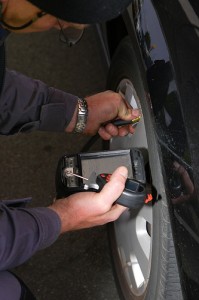An easy way to save money with the tough economic times and the rising gas prices is to take proper care of your vehicle. By keeping up with maintenance checks, your car will not only last longer but will also cost less in repairs and upkeep in the long run. One aspect of car care that cannot be forgotten is proper tire maintenance. This means rotating your tires every 6,000 miles, and checking your tire pressure every other time you fill up at the gas station.
About 54 percent of Americans drive on under-inflated tires. Under-inflated tires can lower gas mileage by 0.3% for every one psi, or pound per square inch, drop in all four tires. The Department of Energy estimates that 3.56 million gallons of gas are wasted each day because of incorrectly inflated tires and advises motorists that they can improve gas mileage by approximately 3.3% by keeping tires inflated to the proper pressure. The main reason why motorists save money by maintaining proper tire inflation is because tires that wear evenly last longer before needing repair or replacement. Because a typical tire may also lose 1 to 2 psi a month if not checked and adjusted, uninformed motorists may be heading faster toward tire replacement than necessary.
One way to stop this decline toward tire replacement is to keep your tires properly inflated longer with nitrogen tire inflation. Just top off your tires with nitrogen next time you are at the service station, or even the next time you check you tire pressure, and you’ll notice a difference. Nitrogen permeates tire walls up to 4 times slower than air, so with nitrogen, you’ll see the same 1 to 2 psi loss in pressure over a period of six months, instead of the regular one month with regular air.
Therefore, you save money on overall car maintenance, because that’s fewer times you have to replace them or get them filled. It’s still recommended to do your scheduled maintenance checks and tire rotations, but you’ll have safer, more fuel-efficient tires. If needing an excuse to get to the mechanic or service station, now is as good a time as any for a checkup, since the summer travel season is just getting started. Getting your car ready for warm-weather driving should start with having the service department check the vehicle to look for specific problems, including safety issues, that may need to be corrected. It’s also a good time for maintenance, such as an oil change.






